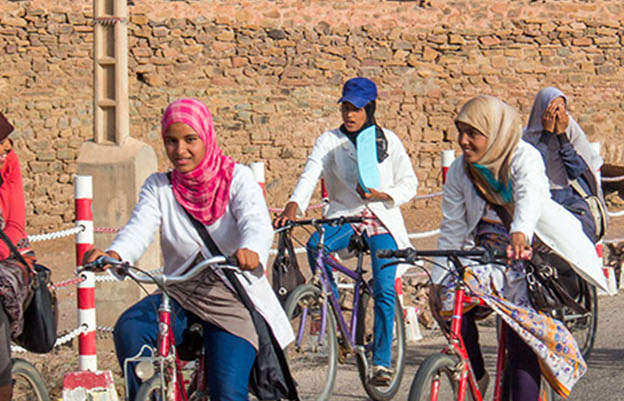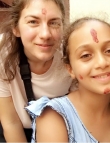First impressions: a ceremonious day
The day before I left to Rabat, I realised I would arrive on the eve of what is considered the holiest festival in the Islamic calendar, Eid al-Adha. Its other name being the “feast of the sacrifice.” What I experienced on the first few days of my stay in the Medina (old Islamic city) will definitely be a vivid memory for some time.
Baaahingg
Fast forward to waking up in the Riad (a traditional house found in the Medina, an old Islamic city). I opened the door onto the courtyard covered in blue skies, pink flowers, and geometry tiled walls. Oh, and not to forget the background ‘baaahingg’ of the sheep being kept by the neighbouring families. Another young woman soon emerged from the opposite room. We were in the same boat, informed that the shops in the souq (market) would be closed for the four days of Eid. Though for many the holiday period lasts much longer as people take their yearly opportunity to visit family in the mountains and countryside.
Moroccan hospitality
Despite this, we went on an adventure to find something. We walked down our quaint colourful street. The smoky air tinged my palate and on the first corner we found boys and their elders around a fire, roasting the heads of the sacrificed mutton. We greeted them, “as- salamu alaykum” and continued. Further down street blood trickled through the cracks of the floor tiles as women washed the rest away with soapy water. And sheep skins lay out, in bin bags, atop the walls, on the carts. Around the next corner were intrigued by a whole alleyway of the sheep skins. A young man and a young courageous girl stood next to it, they became our doorway into the much talked about Moroccan hospitality. We explained we were looking for somewhere to get breakfast and before we knew it, we were welcomed in with a cup of tea in hand.

Sacrifice ceremony
Sat in the courtyard, we were introduced to the sisters, the cousins, the mothers, the babas (fathers) of the family. Already midday, they had fresh meat to feed us our first breakfast in Morocco. A little while after sipping tea and conversing in poor French, the men of the family began the sacrifice of a sheep in their courtyard. We onlooked the sacrifice alongside the family of the Riad and a Chinese couple that had also been welcomed in. At the time of sacrifice, the family said a prayer out loud. A minute or two later, the courageous young girl ran to the sheep's neck, dipped her finger into the blood and blessed my forehead with it (note: this is not a tradition). I then realised I immersed myself in a new, different culture and I liked it. I felt
connected.

This day was ceremonious for me. Observing such sacred practices so soon gave me immense curiosity about the new society, culture and religion I will get to know. I grew even more gratitude for my life and for this opportunity to live the Medina life.



